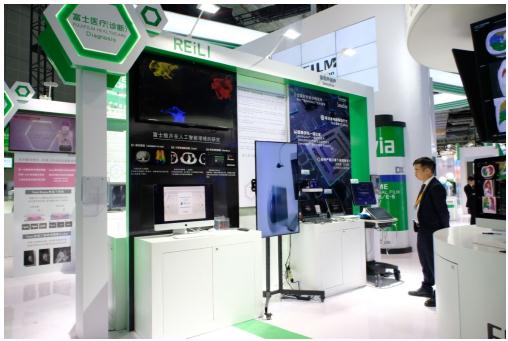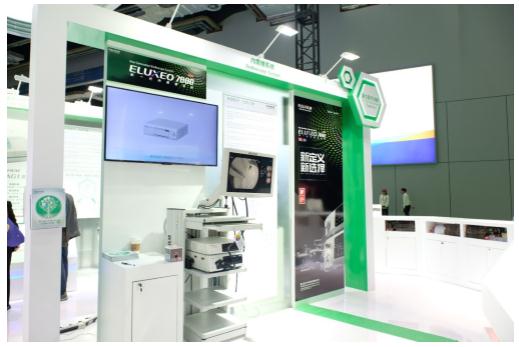Rooted in China, Fujifilm and the latest medical health solutions unveiled the first session of the Expo
The first China International Import Expo (hereinafter referred to as “Incoming Expoâ€) officially kicked off in Shanghai. Fujifilm brought its latest products to the medical device and medical care exhibition area to showcase its latest technology products and technologies, among which medical health technology solutions The program is the focus of the show.
Film started, extending the three major medical business
84 years ago, Fujifilm started as a film company. Today, it mainly has six major businesses: medical health, high-performance materials, graphic arts, imaging, optoelectronics and document processing. Among them, the medical health business is not only the highlight of Fujifilm business, but also It further expands an important breakthrough in the Chinese market.
It is reported that after decades of development of Fujifilm, Fujifilm solutions have comprehensively covered the three areas of “preventionâ€, “diagnosis†and “treatmentâ€. Since 1936, Fujifilm has successfully developed medical X-ray films for the first time. In 1983, it launched the world's first Fujifilm computer X-ray imaging system (FCR). Since then, based on the experience of “collagen, anti-oxidation technology and nanotechnology†accumulated in the film era, it has developed functional skin care products and nutritional supplements to maintain human health products, thus entering the field of “preventionâ€; Launched such as PACS, medical imaging network system SYNAPSE, dry biochemical analyzer DRY-CHEM, Endoscope, ultrasound, digital radiography system and medical artificial intelligence brand "REiLI"; in the field of "treatment" have launched anti-cancer Drugs, anti-influenza drugs "T-705 tablets" and regenerative medicine related products.
Mr. Wu Haobo, President of Fujifilm (China) Investment Co., Ltd., introduced in the interview that the REiLI brand mainly uses artificial intelligence technology and a series of medical image diagnosis to automatically determine the position of human organs after deep learning of the computer and determine the location of the lesion. The site, a series of diagnosis and judgment, after the diagnosis results, the next treatment process, and report, etc., provide a comprehensive solution.

It is reported that REiLI has not yet achieved clinicalization. If process optimization can be achieved in the future, it will help improve the diagnostic efficiency of doctors and ultimately improve the satisfaction of patient services, and ultimately contribute to “Healthy China 2030â€. To this end, Fujifilm will increase its investment in further development of REiLi Medical AI.
In October of this year, Fujifilm Holdings Co., Ltd. and the academic research and development base of the next generation AI technology, FUJIFILM Creative AI Center "Brain(s)" was officially established in Tokyo. Fujifilm plans to work with academia to combine its original AI technology with linguistic knowledge such as diagnostic reports and medical reports, as well as human experience and understanding, to jointly develop next-generation AI technologies that solve various social problems, and provide innovative models. Products and solutions.
Mr. Wu Yibo said: “Fuji Film has successfully transformed into a diversified technology-oriented innovation company. In fiscal 2017, the medical and health business accounted for approximately 18% of the overall business of Fujifilm Group. The medical and health field as the future growth of our company Fujifilm is committed to the development of the business in this field." It is understood that Fujifilm's medical health business plan has reached 500 billion yen in sales in 2019, and Fujifilm is also in the pharmaceutical business and regenerative medicine business in the investment stage. Research and development are accelerating.
Two major changes to help healthy China 2030
In the 1960s, Fujifilm started its business in China, and in the 1990s it opened its production base and officially started production. Today, Fujifilm has 29 subsidiaries (including 10 plants) in China and employs approximately 16,000 people (July 2018 data). At present, sales in the Chinese market account for approximately 12.2% of Fujifilm Group, and China has become a vital market for Fujifilm.
It is reported that Fujifilm's various diagnostic medical devices have a high market share in the world, especially in China, using laser's new image diagnosis solution - LCI/BLI endoscope system and dual-mode three-dimensional tomography High-end products such as photographic mammography systems have been well received by many physicians.
In telemedicine , Fujifilm is also committed to developing IT software that supports telemedicine. At present, regional medical PACS has been introduced and successfully operated in Tianjin, China. In the future, Fujifilm will continue to increase the promotion of joint sharing of medical information between regions, support telemedicine, and promote the implementation of hospitalized grading and treatment systems.
On October 25th, Fujifilm signed a memorandum of cooperation with Zhejiang Haizheng Pharmaceutical Co., Ltd., China-Japan Friendship Hospital, and National Emergency Prevention and Control Drug Engineering Technology Research Center to jointly promote the clinical development of anti-influenza drugs in China. In this cooperation, Fujifilm will provide clinical data of “T-705 tablets†to assist in clinical development of the project.

In recent years, China has changed from a world factory to a world market. The market scale and speed of change have never been seen before. The previous business models for the European, American and Japanese markets are no longer applicable to China. Foreign companies only have more priority in the Chinese market. Based on China, discovering needs and meeting needs, it is possible to succeed. Mr. Wu Yibo believes that Fujifilm will launch two transformations for the Chinese market, namely, discovering the latest demand in the Chinese market, increasing targeted R&D, and gradually realizing “real estate consumptionâ€, while finding the ideal local partners to jointly develop suitable for the Chinese market. s solution.
"This time, Fujifilm entered the medical device and medical care exhibition area, not only because the company successfully developed medical X-ray films as early as 1936, but also accumulated decades of 'prevention' 'diagnosis' 'treatment' A series of solutions and experience is also that Fujifilm is actively exploring how to use its own technology and products to participate in the goal of 'Health China 2030'. Fujifilm hopes to deepen its localization development strategy and further expand its business with local Chinese companies through this platform. Cooperation.†Mr. Wu Hao Bo Xin said.
Medical Ent Instrument,Rigid Ent Esophagoscope,Fiber Optic Esophagoscope,Ent Rigid Esophagoscope
ZHEJIANG SHENDASIAO MEDICAL INSTRUMENT CO.,LTD. , https://www.sdsmedtools.com